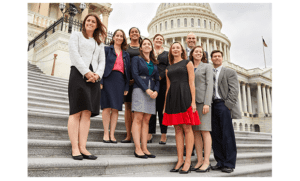Genetics and Public Policy Fellowship


Applications are open until November 30th, 2023. Apply today!
Advances in research and their successful translation to improve health are deeply influenced by important policy decisions at the national level.
From guiding research agendas to informing the integration of genetics and genomics in the clinical setting, sound, evidence-based public policies can inform, enhance, speed, and increase equitable access to the benefits of genomics research. Those policies are better informed with participation from people with expertise in genetics and genomics.
The American Society of Human Genetics (ASHG) and the National Human Genome Research Institute (NHGRI) co-sponsor the Genetics & Public Policy Fellowship to give genetics professionals an opportunity to contribute to the policy-making process. It is designed as a bridge for genetics professionals wishing to transition to a policy career.
This fellowship program is for genetics and genomics professionals with an advanced degree who are early in their careers and interested in the development and implementation of genetics-related health and research policies at a national level.
The fellowship provides experiences working:
- In the National Institutes of Health within the Executive Branch
- With ASHG in the non-profit science policy and advocacy sector
- In a staff position on Capitol Hill serving elected officials in the Legislative Branch
A bimonthly colloquium will provide dedicated learning about the many facets of science and public service. The program will include opportunities to engage directly with eminent researchers and leaders in federal agencies, congressional offices, nonprofit organizations, foundations, and other organizations dedicated to science in the public service.
Duration of Fellowship: 2 years
Start Date: July 1, 2024
Location: Bethesda, MD (NHGRI); Rockville, MD (ASHG); Washington, DC
Compensation and Benefits: Annual $79,000 salary plus benefits including medical, dental, and vision insurance; retirement plan matching; and a training/travel allowance.
The selected fellow will participate in three different rotations over the course of two years in the following three areas: six months each at NHGRI and ASHG, followed by a year on Capitol Hill.
Policy and Program Analysis Branch, Office of the Director at NHGRI: Participate in a variety of projects related to genomics policies and other activities such as the development of the institute’s federal budget justification.
Advocacy at ASHG: Work within the ASHG Policy and Advocacy department on Society advocacy initiatives and on policy issues related to genetics research and non-clinical applications of genetics in society.
Congressional office and/or Committee: Work within the office of a Member of Congress or a Congressional committee with jurisdiction over biomedical research, health, or science. Fellows determine their positions based on availability and their own interests and participate fully in staff functions during this time.
The activities of the fellow will vary with each rotation. They will include research and analysis on a wide range of policy issues impacting biomedical research and its clinical application and summarizing those analyses for different audiences. Writing tasks may include crafting new policy position statements, preparing testimony, summarizing legislation and drafting speeches. The fellow will participate in a variety of forums and will be expected to represent the involved organizations effectively in individual meetings and larger settings.
Applicants for this fellowship must meet all the criteria below.
Applicants must:
- Have earned (or will earn prior to the start of the Fellowship) an advanced degree (e.g., Masters, PhD, MD, or JD).
- Have demonstrated expertise and/or interest relevant to human genetics or
- Be eligible to work in the United States as visa sponsorship is not available.
Employment offers will be contingent upon a satisfactory federal background check.
ASHG is an Equal Opportunity Employer, including for disability and veteran status. All eligible applicants may apply. The Society is committed to building a diverse and inclusive community of human genetics and genomics professionals, welcomes applicants from diverse backgrounds, and strongly encourages individuals to apply who:
- Are from racial and ethnic groups that are underrepresented in the genetics and genomics fields;
- Have a disability;
- Are/were Pell Grant-eligible in college;
- Are/were enrolled in Tribal Colleges and Universities, community colleges, Hispanic-serving institutions, or Historically Black Colleges and Universities (HBCUs);
- Identify as LGBTQ+;
- Were disadvantaged by life circumstances that have negatively impacted their educational opportunities; and/or
- Have a demonstrated commitment to inclusion and support for a diversity of perspectives and backgrounds.
If you require reasonable accommodation for any part of the application process, please contact fellowships@ashg.org.
A complete application packet must be submitted by November 30th, 2023 and consists of the following:
- Candidate information and contact information
- Educational history
- A cover letter explaining your interest in the program. The cover letter should be concise (max 2 pages) and address:
- Why you’re interested in this fellowship.
- How this fellowship fits in with your longer-term career plan.
- How your educational, research, and/or policy background makes you an excellent candidate.
- Your CV or resume
- Contact information for three professional references.
Competitive candidates will be early in their career and should possess a scientific knowledge base, express a keen interest in transitioning to a career in science or health policy, and be able to articulate why they need the fellowship to make this transition. Outstanding candidates will have sought policy-related experience. Demonstrated skills in oral and written communications are essential.
The selection committee is typically impressed by individuals who have pursued opportunities to become involved in policy or who have taken part in other activities outside of their primary responsibilities. Pursuing such activities demonstrates that the applicant has some sense of what policy work entails. Examples might include:
- Sitting on a policy committee at their institution
- Participating in an organization for early-career scientists
- Contributing to a science policy newsletter
- Writing for a local newspaper on policy issues
- Completing a short policy fellowship
- Volunteering at the local office of a member of Congress
- Participating in a day lobbying Congress in support of biomedical research
Applications will be screened for eligibility and reviewed by ASHG and NHGRI staff.
Top-ranked candidates will be invited for virtual interviews beginning in January. Those candidates will be given a policy memo exercise ahead of their interview.
Selected fellows will be notified in spring.
Previous Genetics & Public Policy Fellows maintain close ties and have moved on to a variety of positions in science policy and advocacy. Explore their current positions and reflections on their fellowships.

Manager, Advocacy and Public Affairs
American Society of Human Genetics

Chief, Policy and Program Analysis Branch
National Human Genome Research Institute

Associate Director, Fellowship Programs
American Society of Human Genetics
Contact the program at fellowships@ashg.org or submit our Fellowship Interest Form to be notified about key Fellowship dates.
